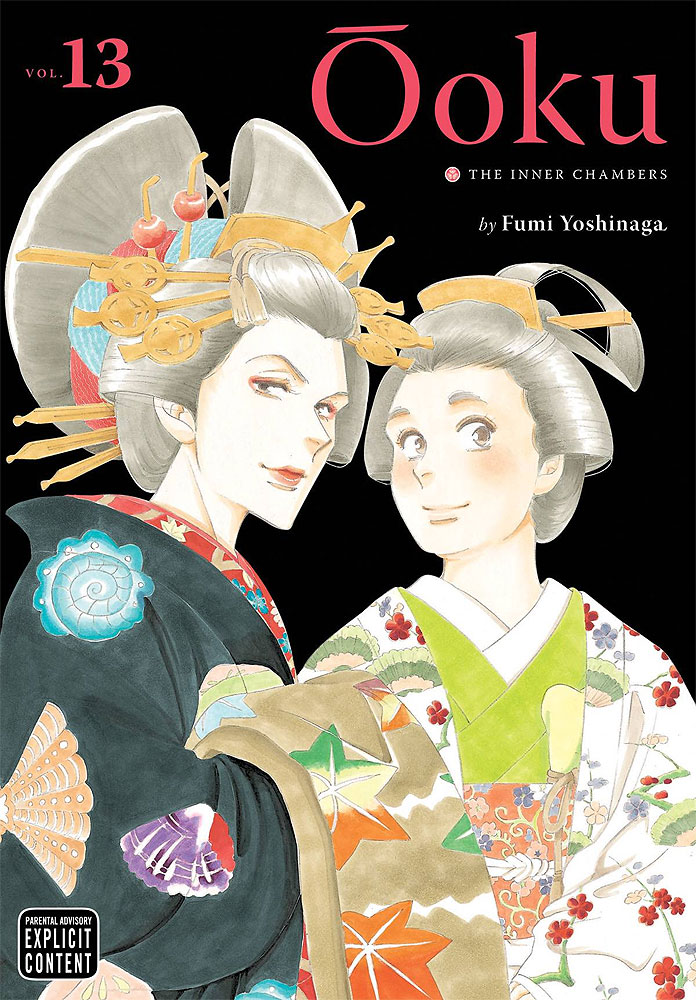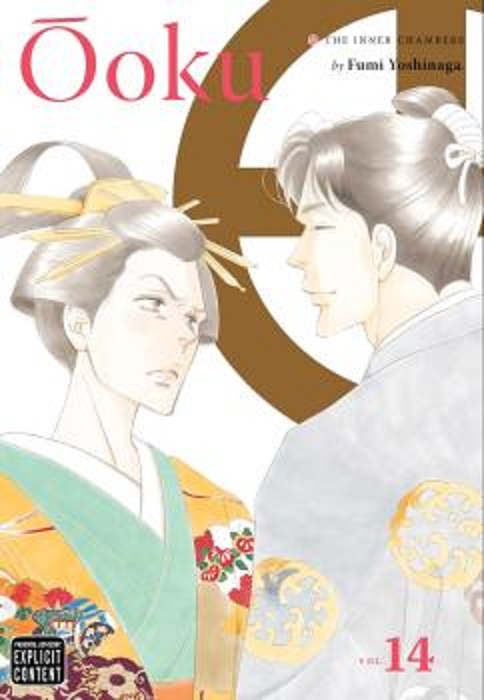Manga Review: Ōoku Volumes 13 & 14 by Fumi Yoshinaga
Note: This review may contain SPOILERS for earlier volumes; you may want to read previous reviews if you are unfamiliar with the series.
Quick recap: In an alternate history, Shogunate Japan was struck by an epidemic of “red-faced pox”, also known as “bearpox.” For unclear reasons it was both extremely transmissible and only killed boys and young men. As a result, women had to do many of the jobs that had previously been reserved for men. This included the role of Shogun, military governor of the country (and the practical ruler, as at this point the Emperor was expected to handle a religious/ceremonial role.) To conceal this from the outside world, all the female Shoguns took male names, and foreigners were confined to specific enclaves.

At the beginning of the thirteenth volume, it’s been a couple of decades since a way was found to vaccinate against the pox. As a result, the number of boys reaching adulthood is on par with the girls, and men are returning to the jobs requiring physical strength and size, allowing women to concentrate on household affairs as they did in centuries past.
But not everyone is down with snapping back all the way. The recent male shoguns had too many children, and the coffers have been emptied. The current shogun, Tokugawa Ienari, is one of those who wants to restore men to their “rightful” place of being in charge. He’s not trustful of women since it turned out his mother had been systematically poisoning everyone who got in her way, including his wife and some of his children.
The volume opens with a story about how the Abe clan became the most trusted retainers of the Tokugawa clan. Abe Masayasu, sickly and not ready for the rigors of government work, pushes his sister Abe Masahiro into taking over headship of the clan and becoming Baron of Ise. Ienari isn’t thrilled with this, but he may be pushing his son Ieyoshi to make his oldest daughter Sachiko the designated heir. Ieyoshi doesn’t have the best reputation, and a female shogun may be needed to balance the economic books. So he accepts Abe Masahiro as a retainer, and has her meet Sachiko.
The heir apparent may have only hit puberty recently, but she is already familiar with history and the relations of the various families her clan interacts with. She and Masahiro have a good meeting, shadowed by Sachiko getting an unannounced visit from her father.
We then swerve to the backstory of Takiyama, a kagema (male prostitute) whose mother was a low-ranking samurai retainer. He had hoped to go into medicine, but a scandalous affair resulted in a murder-suicide of his parents, and his older brother also committed suicide. The family property was seized, and he was sold into prostitution.
He’s visited by Abe Masahiro, who is impressed not only by his male beauty, but his sharp wit and ability to think deeply. Since he’s aging out of his profession, Masahiro buys out his contract and has him retrained to become a chamberlain of the Inner Chambers that the series is named after.
Abe Masahiro shows her wisdom and diplomacy skills, and is soon Senior Counselor. Sachiko takes the shogun name of Tokugawa Iesada, but she isn’t shogun yet, and is not getting along with Takiyama…until he works with Masahiro to restrict Ieyoshi’s access to his daughter.
Iesada’s first two husbands meet unfortunate fates and she begins to wonder if she’s cursed. And suddenly, it’s 1853, and Commodore Perry has arrived!

In the fourteenth volume, the shogun and the government of Japan must figure out what to do about the American demands that the country be opened. The “expel all foreigners” faction is delusional about Japan’s chances of fighting against a technologically advanced military. On the other hand, Japan effectively becoming a vassal of a Western power, as happened to Qing China, is an unacceptable outcome.
Meanwhile, Iesada’s third consort arrives. He’s Taneatsu, a handsome and well-mannered samurai from the distant province of Satsuma. He’s been saddled with multiple agendas, as his domain lord wants to increase the influence of his clan, and of men in general. Others would like him to kill his spouse, while he wants to be a good husband to the best of his ability.
There’s discussion of whether the succession should go to Tokugawa Yoshinobu, Iesada’s male cousin, who strikes Iesada as heartless, and is notoriously non-committal on any current affairs questions, or her female cousin Lady Tomiko, who is still a child. Taneatsu suggests that possibly, if Tokugawa Iesada bears her own child, that would be the logical heir, but her problems with sex and ill health may preclude that.
As the series approaches the modern era, and presumably the fall of the shogunate, I have to wonder if there will be lasting changes to the timeline or if history will “course-correct” so there will be no differences past, say, the Meiji Restoration.
The art and writing continue to be excellent. I understand that there are now live-action and animated adaptations.
Content note: These volumes have some particularly harsh material. While we never see any of it on-page, Ieyoshi repeatedly rapes his daughter Iesada, and to a large extent gets away with it. While she hides the fact, Iesada suffers long-term trauma that affects her relationships with others, including her consorts.
Takiyama is up front about the fact that he’s had to service both male and female customers, and anal sex is mentioned. He’s also had to dress and act as a woman for his clients, which was not a free choice on his part.
There’s murder and suicide, misogyny and misandry. Oh, and just a little consensual sex (no nudity.) Overall, these volumes will be a rough read for the sensitive reader, and certainly not for children.
This continues to be a fascinating series, heavy on how politics affects personal relationships, and how a shift in gender roles affects how those relationships play out. Recommended for mature readers with an interest in those subjects, and a taste for tragic romance.

